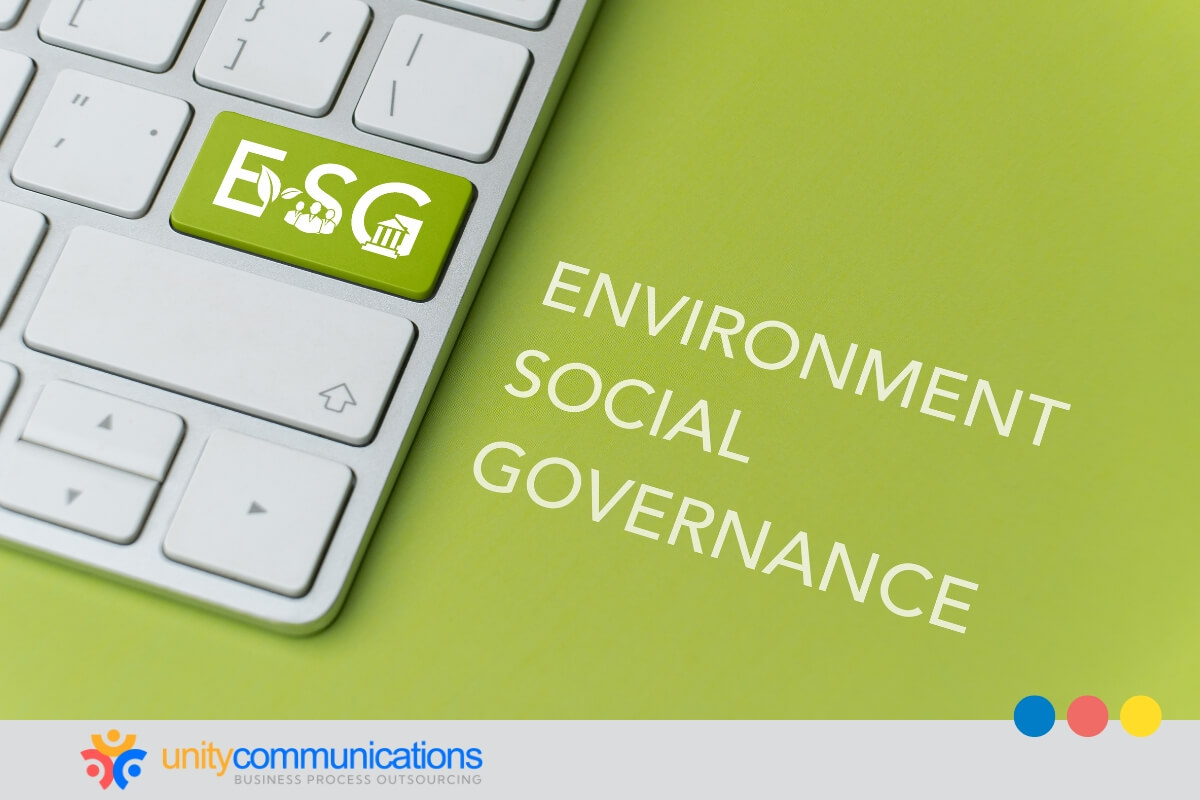Table of Contents
Corporate social responsibility (CSR) is a cornerstone of ethical and sustainable business practices. As more companies increasingly turn to business process outsourcing (BPO) to optimize operations, ensuring CSR compliance across outsourced operations is more critical than ever.
CSR reporting for outsourced operations promotes transparency, accountability, and ethical standards. A 2023 McKinsey report found that 70% of companies see improved stakeholder trust with robust CSR practices.
This guide outlines how to integrate CSR into outsourcing strategies, navigate compliance challenges, and apply proven best practices for accurate and transparent reporting.
Integrating CSR into outsourcing to achieve ethical excellence

Integrating CSR into outsourcing strategies upholds ethical, social, and environmental values across the supply chain. Understanding what BPO is, its role in global operations, and how outsourcing works is essential for aligning BPO with responsible practices.
Aligning outsourcing decisions with CSR principles protects a company’s reputation and enhances long-term sustainability. In 2022, 96% of the world’s top 250 companies published sustainability reports, which follow standards based on stakeholder materiality assessments. Reporting rates are expected to increase with new non-financial reporting regulations.
You can integrate CSR today by selecting BPO partners with substantial environmental, social, and governance (ESG) policies and adherence to recognized reporting standards, such as the Sustainability Accounting Standards Board (SASB). Clear communication of CSR expectations and collaboration on sustainability goals create a cohesive approach to ethical outsourcing.
Moreover, embedding CSR criteria in the vendor selection helps determine whether potential partners share your company’s commitment to ethical practices. This approach minimizes risks and builds a foundation for long-term, socially responsible partnerships.
Overcoming distance and disparity
Today’s global economy features international labor standards that should supposedly promote economic growth for everyone. Despite this goal, CSR compliance in outsourced operations remains challenging for many reasons.
Adhering to labor laws is inconsistent in some countries. For example, a University of Nottingham study revealed ongoing labor violations in Bangladesh’s garment sector, including underpayment and overworking. These problems emphasize the persistent gaps in transparency and accountability.
Discrepancies in local governance of ESG regulations and sustainability reporting standards complicate consistent oversight. For example, the disparity between the European Union’s stringent environmental policies and the more relaxed standards in some Southeast Asian countries creates compliance gaps.
You can settle these differences by establishing universal CSR principles and providing localized training to your BPO vendors. Other ways to address these challenges include:
- Creating robust monitoring systems and clear contractual CSR obligations
- Allowing third-party audits
- Leveraging technology for real-time data collection and reporting
- Mitigating the risks associated with distance through strong communication channels and regular on-site visits
- Using data analytics to provide actionable insights for CSR performance
To overcome these cross-border challenges, companies must take proactive steps to bridge regulatory and operational gaps in outsourced environments.
8 best practices for transparent CSR reporting in outsourced operations

Adopting best practices promotes accuracy, transparency, and accountability and helps you navigate the complexities of CSR reporting for outsourced operations.
The following eight strategies provide a comprehensive approach to enhancing CSR performance and reporting:
1. Establish clear CSR expectations in contracts
Defining CSR expectations in outsourcing contracts is crucial for maintaining ethical and compliant operations. These documents should outline social and environmental responsibilities, ESG regulations, and adherence to international reporting standards. A structured approach strengthens outsourcing with corporate governance principles and values and aligns it with global best practices.
Apple’s Supplier Code of Conduct is a solid example of this approach. It mandates strict compliance with labor rights, environmental protections, and ethical business practices. The company sets transparent requirements to ensure its partners understand and prioritize their CSR obligations.
Additionally, penalties for non-compliance and incentives for exemplary CSR performance reinforce these commitments and encourage continuous improvement. This proactive strategy minimizes risk and enhances sustainability reporting and the integrity of supply chain operations.
2. Allow third-party audits
Third-party audits provide unbiased assessments of CSR compliance in outsourced operations. The 2023 Corporate Sustainability Reporting Directive (CSRD) emphasized the importance of independent audits to verify the accuracy of sustainability reporting.
Regular audits are beneficial in many ways. They can:
- Detect non-compliance issues so you can correct them before they lead to hefty fines and other severe penalties
- Support continuous improvement by providing actionable insights and tracking progress
- Demonstrate your dedication to ethical practices and long-term sustainability
- Boost brand trust
- Align your business with global CSR standards
Third-party audits have stringent rules. A member state can register a third-country audit entity only if its management body meets required standards, its auditor holds equivalent qualifications, and it publishes an annual transparency report.
Simplify the process by partnering with accredited auditing firms such as SGS or Bureau Veritas. They perform comprehensive assessments of labor conditions, environmental impact, and governance policies and follow globally recognized reporting standards for a consistent and credible review process.
3. Include stakeholders in the reporting process
Another tactic in CSR reporting for outsourced operations is engaging stakeholders, such as employees, customers, investors, and local communities. CSR programs can better address genuine concerns and reflect diverse perspectives by involving those directly affected by business operations.
Younger generations, in particular, value transparency and humanity in brands. Gen Z and millennial customers are 15% more likely than older generations to spend more and stay loyal to brands they see as human. When they perceive a brand as transparent, they are 30% more likely to increase their spending and 20% more likely to choose it over competitors.
These preferences underscore the importance of transparent and honest CSR reporting in maintaining customer trust and driving long-term business success.
Effective stakeholder engagement methods include:
- Public consultations, collaborative forums, and surveys that allow stakeholders to voice their opinions, share concerns, and offer valuable insights
- Integration of feedback into CSR reports to enhance disclosure and show commitment to social and environmental responsibility
Ultimately, engaging stakeholders strengthens CSR reporting, builds trust, improves decision-making, and strengthens your relationships with communities and customers.
4. Use technology for data collection and reporting
A 2023 Deloitte study revealed that 35% of executives identified data accuracy and completeness as their most significant challenge in ESG reporting. About 25% had problems with accessing quality data. To address these issues, 99% of companies planned to invest in advanced technologies and tools over the next 12 months.
Technology is crucial in streamlining CSR reporting. It can collect, analyze, and visualize data in real time. Digital solutions promote data accuracy, reduce manual errors, and facilitate compliance with established reporting standards, such as the SASB and the Global Reporting Initiative (GRI).
Innovative tools help companies track social and environmental performance across outsourced operations and simplify the process of monitoring key CSR metrics.
Here are some leading tools and technologies for CSR data collection and reporting:
- EcoVadis is a sustainability ratings platform that provides insight into supplier performance.
- SAP Sustainability Control Tower is a comprehensive tool for tracking environmental and social impacts.
- Enablon is a type of software that manages ESG data and compliance.
- Workiva is a platform for integrated reporting and data visualization.
- Microsoft Sustainability Manager is a solution for monitoring carbon emissions and sustainability metrics.
These technologies enhance data reliability, improve decision-making, and demonstrate a genuine commitment to CSR objectives.
5. Align reports with global CSR standards
Standardized reporting frameworks, such as SASB, GRI, and the Task Force on Climate-related Financial Disclosures (TCFD), drive consistency and comparability of CSR data. They also enhance the report’s credibility, simplify stakeholder analysis, and support long-term sustainability goals.
Global investors value standardized reporting for greater transparency and accountability in assessing corporate performance and sustainability. A recent survey revealed that 83% of investors incorporate sustainability into their analyses. Around 79% have already adopted formal sustainability policies, up from just 20% five years ago.
Sustainability considerations are also becoming a crucial factor in investment decisions. If the world economy achieves net-zero emissions, global economic growth could reach an estimated $43 trillion between 2021 and 2070.
As businesses face increasing pressure to demonstrate their ESG commitments, aligning CSR reports with global standards provides a clear and consistent framework for communicating progress and driving positive change.
6. Advance transparency and accountability
Transparency and accountability are essential when reporting on CSR for outsourced operations; they boost stakeholder trust and credibility. By openly sharing successes and challenges, companies convey a balanced and honest view of their social and environmental impact. This approach strengthens stakeholder relationships and drives continuous improvement.
One effective way to demonstrate transparency is through annual sustainability reports that align with established reporting standards such as GRI or SASB. These documents should include detailed impact assessments, audit findings, and measurable progress toward CSR goals.
A 2023 survey revealed that 74% of consumers are more likely to buy from companies that are transparent about their sustainability efforts, including claiming carbon neutrality, reducing single-use plastics, and frequently sharing progress. This data underscores the importance of honest reporting in building long-term credibility.
By committing to transparency and accountability, businesses emphasize their commitment to ethical practices and reinforce their position as responsible corporate citizens.
7. Address cultural differences in CSR practices
Outsourced operations often occur in different countries or regions, each with distinct cultural norms, values, and business practices. Aligning CSR efforts with local customs, labor practices, and environmental priorities makes them more effective, respectful, and widely accepted.
Collaborating with local experts is key to bridging global standards and regional expectations. By engaging local stakeholders and providing CSR training for third-party BPO partners, you foster mutual understanding, encourage compliance, and match CSR efforts with international benchmarks while honoring cultural diversity.
Culture shapes stakeholders’ values, beliefs, and expectations, making it vital for CSR initiatives to reflect local norms. Tailoring efforts to cultural contexts helps companies build trust, strengthen relationships, and create a lasting impact in the communities they serve.
Addressing cultural differences in CSR practices also strengthens partnerships, enhances engagement, and ensures the long-term success of CSR reporting for outsourced operations.
8. Seek continuous improvement through feedback
Robust feedback mechanisms benefit CSR reporting for outsourced operations. Gathering and analyzing audit results, stakeholder input, and performance data identifies reporting gaps and improvement opportunities.
The Plan-Do-Check-Act (PDCA) cycle drives continuous enhancement in CSR reporting. This iterative process enables businesses to plan their reporting strategies, implement them, assess their effectiveness, and refine practices based on data-driven insights. Integrating PDCA into CSR reporting for outsourced operations fosters a culture of accountability and responsiveness.
Companies using structured feedback loops see significant improvements in CSR outcomes. Adobe’s system fosters open dialogue about performance, boosts employee morale and productivity, and reduces turnover by 30%. Similarly, Zappos’s employee satisfaction scores soared by 25% a year after implementing its feedback system.
Feedback loops keep CSR reporting for outsourced operations transparent, accurate, and aligned with evolving global standards and industry expectations. They also encourage continuous improvement that cultivates stakeholder trust and credibility.
The bottom line

Effective CSR reporting in outsourced operations requires strategic planning, consistent monitoring, and a steadfast commitment to transparency and accountability. These best practices can strengthen sustainability reporting, align with global standards, and foster brand trust.
This proactive approach ultimately drives long-term positive impact and reinforces your role as a responsible global business. Let’s connect to explore how your organization can improve CSR reporting today.




